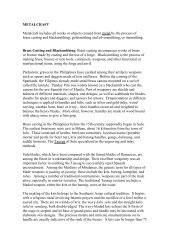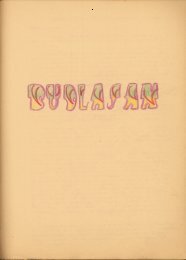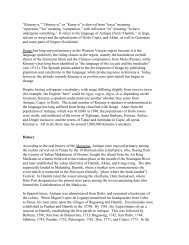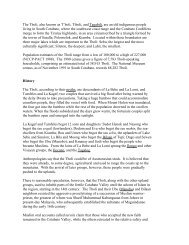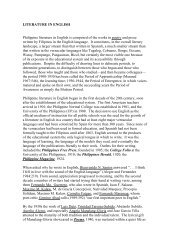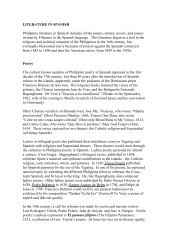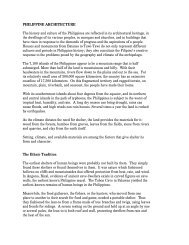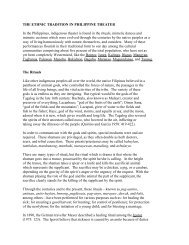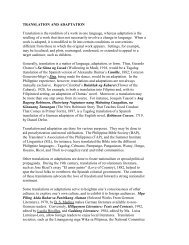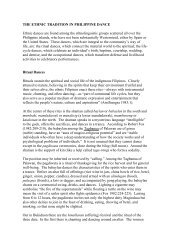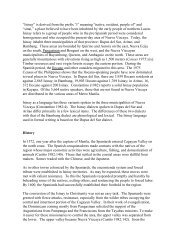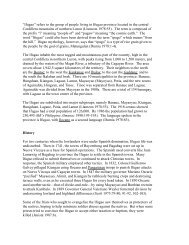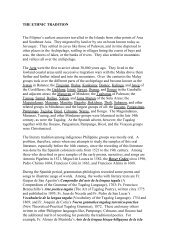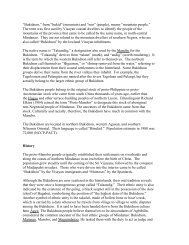The word “Ibanag” derives from the prefix “i” meaning ... - Buffalo
The word “Ibanag” derives from the prefix “i” meaning ... - Buffalo
The word “Ibanag” derives from the prefix “i” meaning ... - Buffalo
You also want an ePaper? Increase the reach of your titles
YUMPU automatically turns print PDFs into web optimized ePapers that Google loves.
discover that it bears a strong resemblance to her husband. She finds close to it <strong>the</strong><br />
man’s raft, fishing net, and fish basket. <strong>The</strong> woman clings to <strong>the</strong> stone figure and cries<br />
vehemently. <strong>The</strong> gods hear her sobs and also changes her to a rock. <strong>The</strong> child who is<br />
left on <strong>the</strong> raft drifts away and he too is changed to a stone. <strong>The</strong> gods feel sorry for <strong>the</strong><br />
family so <strong>the</strong>y give <strong>the</strong> man power over <strong>the</strong> sea and <strong>the</strong> winds in that area. Stories<br />
relate that during <strong>the</strong> Spanish period, a vessel sailed near <strong>the</strong> rocks. <strong>The</strong> sailors were<br />
alarmed at <strong>the</strong> sight of <strong>the</strong> figures. <strong>The</strong> captain, laughing at <strong>the</strong> sailor’s fears, ordered<br />
that a cannon be fired at Lakay-lakay. As <strong>the</strong> bullet struck <strong>the</strong> brim of Lakay-lakay’s<br />
hat, a strong storm came. <strong>The</strong> violent waves broke <strong>the</strong> vessel into pieces and drowned<br />
<strong>the</strong> Spanish captain and <strong>the</strong> sailors. Since <strong>the</strong>n, people have believed that Lakay-lakay<br />
really has power over <strong>the</strong> sea and winds. For this reason, he and his family are feared<br />
by <strong>the</strong> fisherfolk. Those who pass <strong>the</strong> stone figure offer gifts in <strong>the</strong> form of money,<br />
food, cigars, and fruits.<br />
Performing Arts<br />
<strong>The</strong> songs of <strong>the</strong> Ibanag ga<strong>the</strong>red <strong>from</strong> Tuguegarao, Abulug, Dana-Ili, and Pamplona are<br />
called canta or cansion. Some of <strong>the</strong>se songs are versu, pagirau, kinantaran, harana,<br />
an<strong>the</strong>m, aguinaldo, salubong, and medley, all of which suggest Tagalog, Spanish, and<br />
English influences on Ibanag music (Wein 1987:13).<br />
Versu is a term derived <strong>from</strong> psalm verses sung in church. An example is <strong>the</strong> Ibanag<br />
version of <strong>the</strong> “Our Fa<strong>the</strong>r,” entitled “Ama Mi” (Wein 1987:240).<br />
Songs accompanied by action are called pagirau or dance songs (also called sarswela).<br />
Here is an example of a pagirau about <strong>the</strong> “delicious fish” (Wein 1987:40):<br />
Si presyon si dalag<br />
Si Afer ari makaddeddag.<br />
Si ifun kawadittan,<br />
Si munamun ya kakastan.<br />
Si tangi karalletan,<br />
Si bangus ya kasingngattan.<br />
Ilutu ngana sangau. (2x)<br />
Masingngo sangau ikan.<br />
Pressured is “dalag”.<br />
Afer cannot wait [to eat it].<br />
“Ifun” is <strong>the</strong> smallest,<br />
“Munamun” <strong>the</strong> most beautiful.<br />
“Tangi” is <strong>the</strong> biggest,<br />
“Bangus” <strong>the</strong> most delicious.<br />
I am going to cook now. (2x)<br />
<strong>The</strong>n <strong>the</strong> fish will be very tasty.<br />
<strong>The</strong> kinantaran is characterized by singing and an enactment in <strong>the</strong> form of a dialogue.



